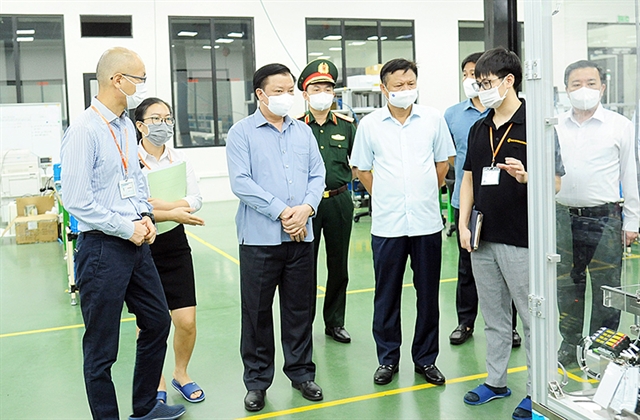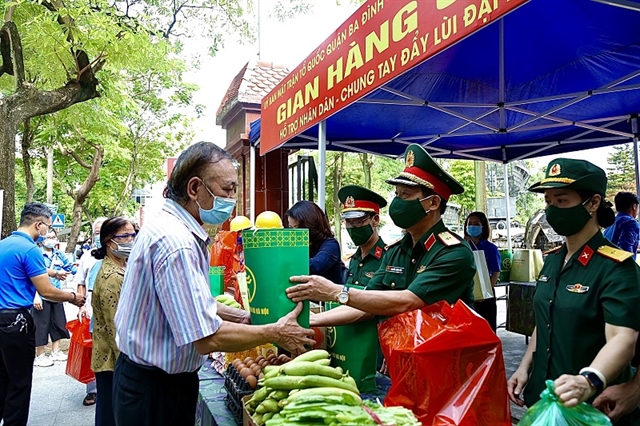 Society
Society

Hà Nội will work towards a safe and flexible living situation with COVID-19, in a bid to begin the capital's economic recovery, the city’s leader has said.

|
| Secretary of the Hà Nội Party Committee Đinh Tiến Dũng visits an enterprise in Hà Nội after it resumed production activities following 60 days of strict social distancing. Photo kinhtedothi.vn |
HÀ NỘI – Hà Nội will work towards a safe and flexible living situation with COVID-19, in a bid to begin the capital's economic recovery, the city’s leader has said.
Secretary of the city’s Party Committee Đinh Tiến Dũng said Hà Nội had gradually resumed a number of activities since September 16.
But he warned that the risk of infection in the city remained high, so asked for caution as the capital puts plans in place to live in the 'new normal' situation.
Hà Nội has experienced a long period of strict social distancing after the COVID-19 outbreak worsened with a number of new clusters and unknown infection sources.
Back in July, the city reported 53 new cases with 32 locally transmitted and many without an identified infection source. At that time only a fraction of the population had been vaccinated with around 26.5 per cent of adults receiving just one shot.
Hà Nội was on high alert and at an urgent meeting held on July 23, the Standing Committee of the City Party Committee imposed a two-week social distancing period to begin the next day.
Under Directive 16, people were told they could not gather in groups of more than two in public places, and only leave home for emergencies to buy food and medicine.
Although strict, the regulations began to see results and by the beginning of September, the pandemic was under control and the city eased restrictions.
Dũng said the 60 days of strict social distancing was the toughest of times for the capital, causing great economic losses.
Due to the top priority of protecting the health and safety of people, the city halted most of its business and production activities, which led to a drop of 7.02 per cent in GRDP in the third quarter.
But more and more people were vaccinated, with most adults receiving their first dose. At the same time, medical treatment capacity greatly improved.
Since the fourth wave began, there has been a total of 4,273 cases in the capital, accounting for just 0.4 per cent of the country's tally.
However, Dũng said the city had maintained essential supplies of goods with stable prices.
The city's GRDP in the second quarter still increased by 6.61 per cent, contributing to boosting the overall growth in six months to 5.91 per cent and 1.28 per cent over the first nine months of the year.
The city provided aid to other localities, sending 5,000 tonnes of rice worth VNĐ75 billion to HCM City, Bình Dương Province 1,000 tonnes of rice and 18 southern cities and provinces VNĐ3 billion worth of rice each.
Dũng said economic recovery would be the priority as the year ends, but the city would carefully determine the steps to ensure safe co-existence with the virus.
Currently, the percentage of fully vaccinated citizens remains low – about 23 per cent of the city’s adult population and those under 18 remained unvaccinated.
There were still potential risks of new outbreaks, particularly following the emergence of a cluster at the Việt Nam-Germany Friendship Hospital, which to date had seen 41 new cases, he said.
Dũng said the city planned to accelerate the recovery of socio-economic development, focusing on three important tasks, including accelerating the progress of the disbursement rate of capital construction investment; implementing budget revenue and expenditure management effectively; and stepping up administrative reform while easing difficulties for businesses.

|
| The city organised many zero-dong shops to help disadvantaged people and workers affected by the pandemic. |
To be able to do that, the city would propose the Government and the Ministry of Health allocate enough vaccine doses to give second doses to all citizens by the end of this month.
VNĐ500 billion ($21.9 million) from the city’s budget had been allocated to help businesses get loans and resume their production activities.
It had set up scenarios to react to the pandemic at different levels while ensuring economic growth.
For new outbreaks such as the Việt Nam-Germany Friendship Hospital, the city had focused on zoning and tracing to minimise the spread of the virus, he said. VNS




